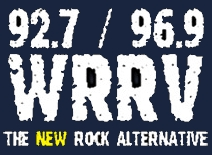WRRB
 |
|
| City | Arlington, New York |
|---|---|
| Broadcast area | Mid-Hudson Valley |
| Branding | 92.7/96.9 WRRV |
| Slogan | The Hudson Valley's Alternative |
| Frequency | 96.9 MHz |
| First air date | 1989 (as WEXT) |
| Format |
Alternative rock (simulcast of 92.7 WRRV Middletown) |
| ERP | 310 watts |
| HAAT | 307 meters |
| Class | A |
| Facility ID | 10780 |
| Callsign meaning |
WRRB sounds similar to WRRV Also WRRV B (secondary) signal |
| Former callsigns | WEXT (1989-1991) WKIP-FM (1991-1993) WDSP (1993-1997) |
| Owner |
Townsquare Media (Townsquare Media Poughkeepsie Licenses, LLC) |
| Webcast | Listen Live |
| Website | wrrv.com |
WRRB is an alternative rock radio station licensed to Arlington, New York and serving the Mid-Hudson Valley of New York state. The station is owned by Townsquare Media and broadcasts on 96.9 MHz at 310 watts ERP from the Illinois Mountain master tower in Marlborough, New York
WRRB's programming is simulcast with that of 92.7 WRRV Middletown, New York which serves the lower Hudson Valley, Catskills, Sussex County, New Jersey and Pike County, Pennsylvania. Though on paper WRRV is seen as the primary station, in reality WRRB is the more dominant of the two based on cume and sales (and the fact that, since 2000, the station has been run out of the longtime studios of sister WPDH on Pendell Road in Poughkeepsie). Information on the specifics of WRRV's format can be seen in the article on WRRV.
The 96.9 frequency came on the air in Fall 1989 as Bridge Broadcasting-owned WEXT ("Next FM") running a "new adult contemporary" format (a combination of smooth jazz and new-age music). Aside from its licence, WEXT had another first in being the first station operated by a local marketing agreement as WKIP/WRNQ owner Richard Novik later controlled WEXT.
WEXT's format was a bit ahead of its time and though it had a strong start and admiration of music critics and musicphiles, however this critical success did not translate into ratings as "Next FM" was the market's lowest rated FM signal in its only Arbitron ratings book in 1990. Even with the station's poor ratings, it was somehow seen as a threat to the ratings of the more mainstream and successful WRNQ.
...
Wikipedia
